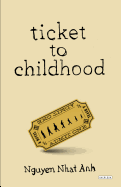
Nguyen Nhat Anh's Ticket to Childhood, deftly translated by William Naythons, provides a compelling if conflicted portrait of modern-day Vietnam. As a parable "aimed at adults who were children once," the novel describes many quixotic attempts by a group of eight-year-olds to "revolutionize" their world. They rename common objects (a notebook becomes a hat, a dog turns into a banana, feet means mouth), hold mock trials of their parents and raise feral dogs as household pets. These adventures often end in parental discipline verging on abuse. In the episode involving dog training, one alcoholic parent winds up with a sumptuous canine feast.
Inspired by Robert Rojdesvensky's poem "A Town from Childhood," the novel wistfully explores the divide between expression (childhood) and censorship (adulthood). The poetic reference is telling: Rojdesvensky spoke against social realism during the Khrushchev Thaw in the 1950s, but later became an active mouthpiece for the Soviet government. Similarly, Anh's criticism of the Vietnamese government reflects a semblance of glasnost. While using allegory to voice his political dissatisfaction, Anh downplays its impact by suggesting that restless citizens are nothing but pampered children: "Children have blind spots. They take parental love for granted. The kids who complain the loudest are often the ones who are loved the best. It takes a certain security to be critical."
While Ticket to Childhood was popular in Vietnam when it was published in 2008, Anh is circumspect about its debut in the U.S. He need not worry. His acrobatic wit, even his political ambiguity, will generate many trenchant discussions. --Thuy Dinh, editor, Da Mau magazine

